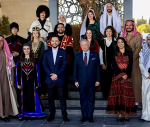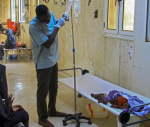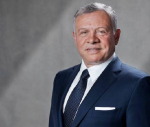You are here
Munich conference: Regaining western self-confidence, reputation
Feb 20,2023 - Last updated at Feb 20,2023
Over 30 heads of state, senior politicians, military officers, diplomats and 110 ministers and business representatives have taken part in the 59th Munich Security Conference, to discuss security challenges the world is undergoing. The current conference comes a week before the first anniversary of the Russian-Ukrainian war that broke out on February 24, 2022, and brought about a remarkable change in the European security landscape, not to mention the economic and political repercussions that had a negative impact on the general mood of the old continent during the past few months. For the first time, Russian leaders have been excluded from an invitation to attend such an event.
Attending the Munich Security Conference this year is very significant to see many developments and many concerns on the faces of Western officials and experts. The European security landscape was subjected to a difficult assay and a subtle test when the West found itself in the crosshairs, facing Russia, which dealt with the western expansion in eastern Europe as a matter of national security and a direct threat to the old Soviet influence, which Moscow mulled as “dwarfing Moscow's role” at the international arena.
Russia’s policies during the last five years in particular, coinciding with the Chinese strategies in exchange for the reduction of European influence over sensitive international annals, and the demise of the EU relatively outside the arena of competition for leadership of the global economy restricted between Washington and Beijing, all of this had prompted the EU leaders to entangle themselves with the eastern camp, believing that turning a blind eye to Moscow’s annexation of Crimea in 2014 has encouraged the Russians to further expansion, in a way that threatens the interests of the European Union and NATO eastward.
At this time in 2022, on the sidelines of the fifty-eighth session of the Munich Security Conference, the European countries, along with the United States, warned Russia of any military operations targeting Ukraine in response to the Russian military reinforcements on the Ukrainian borders at the time. Over the course of a whole year, the Ukrainian arena witnessed dozens of battles between the two camps, the eastern one led by Russia backed by China, Iran and North Korea, and the western one led by NATO, the European Union and the United States, those battles that did not change much of the field situation, which remained fluctuating between Moscow and Washington. In response to Russian operations, the armies of the Western camp have used most of their capabilities to support Kiev in its battle against Russian forces.
Therefore, with the first anniversary of the war, its atmosphere dominated the activities of the current session of the security conference, which was attended by German Chancellor Olaf Scholz, French President Emmanuel Macron, US Vice President Kamala Harris, and dozens of senior officials from many countries.
In his video intervention, Ukrainian President Volodymyr Zelensky called on his allies to expedite support for the Ukrainian forces, saying: "We need speed... speed in concluding our agreements, speed in supplies to enhance our battle, speed in decisions to limit Russian capacity. There is no alternative about speed because life depends on it.” He added: “There is no alternative to Ukraine’s victory,” calling for his country to join the European Union and the NATO as soon as possible.
In response to these demands, German Chancellor Olaf Schultz stressed, during his speech, that every allied country can send its military equipment to Ukraine, noting that his country will take measures in this path by training Ukrainian soldiers and compensating arms stocks in addition to providing logistical materials. The same position was confirmed by the French President, Emmanuel Macron, who called in his speech on the Europeans to "reinvest significantly" in the field of defences, stressing that "today is not the time for dialogue" with Russia, and said: "We must intensify our support for Ukraine to move towards credible negotiations,” tacitly preparing the world for a protracted conflict in Ukraine.
Despite the stress of all participants in the conference on the need to support the Ukrainian forces with advanced weapons, meeting Kiev’s request to provide it with American “F-16” aircraft has not witnessed a breakthrough yet, as British Defence Minister Ben Wallace confirmed that this matter is far from being achieved, as this requires a long time to train Ukrainian pilots, while Western media indicate that there is pressure on the US president from Democrats and Republicans to send these fighters to Ukraine as soon as possible.
The participation of a high-ranking Chinese delegation led by Foreign Minister Wang Yi raised speculation about the possibility of US-Chinese bilateral talks on the sidelines of the conference in an attempt to ease tension between the two parties over the alleged downing of the US spy balloon, which was monitored over a number of secret US nuclear weapons sites at the beginning of the month. This prompted the US Secretary of State Antony Blinken to cancel his scheduled visit to Beijing. The US-Chinese relations suffer from never-ending tensions, which may witness a truce from time to time for emergency reasons, but in general they are on hot tin roof.
With regard to the Iranian issue, for the first time Iranian activists affiliated with the opposition participated in the Munich Security Conference instead of inviting the Iranian regime, as Reza Pahlavi, Masih Alinejad and Nazneen Benyadi were invited, while gatherings of a number of Iranian opponents were allowed outside the venue of the conference in support of the popular uprising in Iran.
In the end, it is clear that there is an irreversible Western insistence on dwarfing the Russian bear and trimming its paws by continuing to put pressure on Russians and their government, while supporting Ukraine financially and militarily to prolong war and provide support Kiev to strike a balance and not to resolve the battle quickly.
The question is that the West will go to the maximum point to support Ukraine regardless of EU domestic issues to prolong the war in eastern Europe in attrition of Russian armed forces. Will the NATO succeed? The answer lies in Moscow and Washington. War will be longer than expected and the coming months will be decisive for both world blocs.











